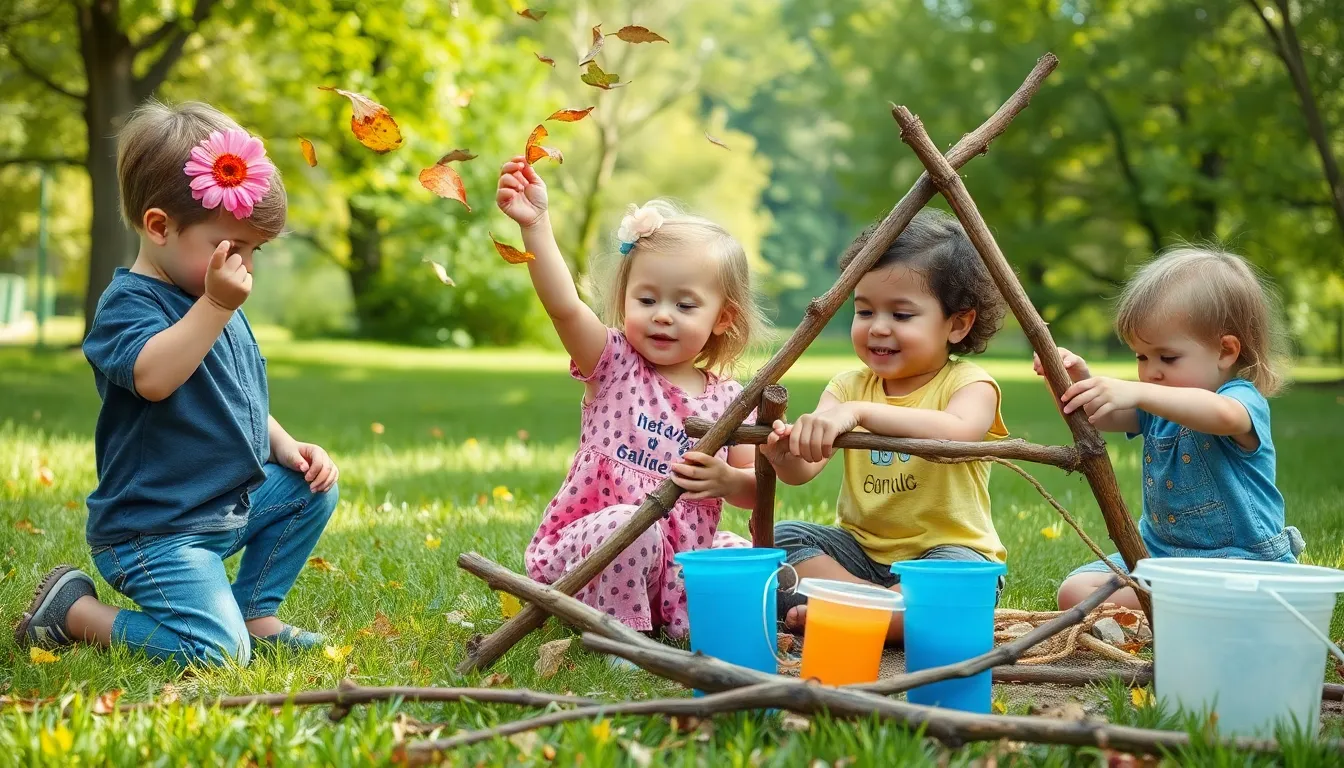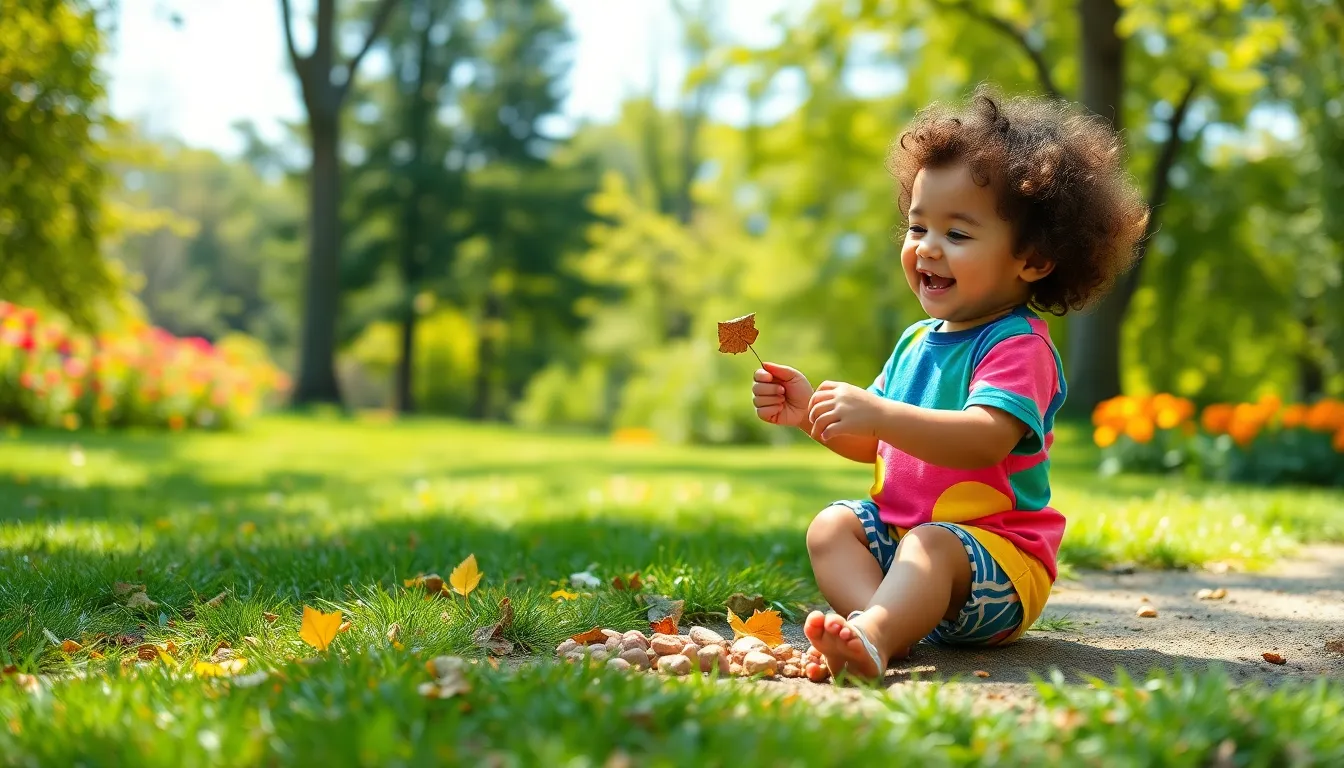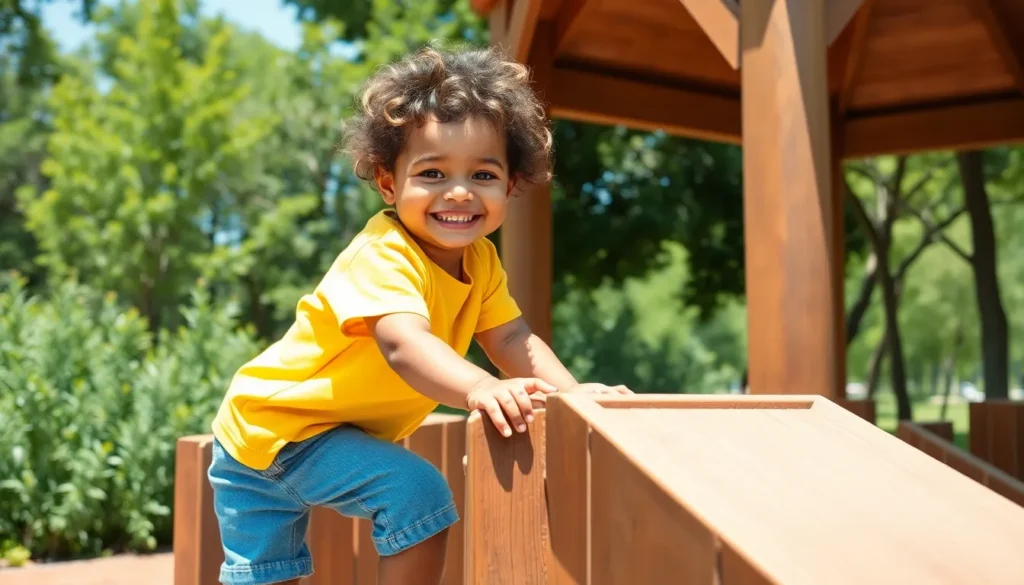Table of Contents
ToggleToddlers are natural explorers, turning every patch of grass into a jungle and every puddle into a splash zone. Outdoor play isn’t just fun; it’s a vital part of their development. Imagine a world where little feet run wild, giggles fill the air, and creativity knows no bounds. Sounds like a dream, right? It’s time to make that dream a reality.
Benefits Of Outdoor Play For Toddlers
Outdoor play offers numerous advantages for toddlers, fostering various aspects of their growth and development. Engaging with nature and open spaces supports their physical, cognitive, and social skills.
Physical Development
Outdoor play enhances physical health in toddlers, promoting active lifestyles. Running, climbing, and jumping strengthen muscles and improve coordination. Activities like balancing on logs or navigating playground structures refine motor skills. Exposure to sunlight helps the body produce vitamin D, vital for bone health. Increased heart rate from vigorous play also supports cardiovascular fitness.
Cognitive Development
Cognitive growth flourishes in outdoor settings, where toddlers make discoveries. Natural environments stimulate curiosity, encouraging exploration and problem-solving. Interactions with varied sensory experiences enhance critical thinking skills. Observing changes in nature, such as weather patterns and seasonal shifts, fosters scientific understanding. Ultimately, outdoor play contributes to improved focus and creativity as toddlers engage with their surroundings.
Social Skills Enhancement
Social skills develop significantly during outdoor play, allowing toddlers to interact with peers collaboratively. Sharing toys and taking turns teach essential cooperation lessons. Group games promote communication and negotiation skills, crucial for conflict resolution. Engaging in role play encourages empathy as toddlers understand different perspectives. Overall, outdoor experiences create opportunities for meaningful connections and friendships among children.
Types Of Outdoor Play Activities


Outdoor play encompasses a wide range of activities that engage toddlers, promoting both development and joy. These activities can be categorized into creative play ideas and structured games.
Creative Play Ideas
Exploring nature offers endless possibilities for creativity. Activities like nature scavenger hunts invite toddlers to search for leaves, rocks, and flowers, enhancing observation skills. Designing outdoor art using sticks and leaves allows toddlers to express themselves while connecting with their surroundings. Building forts with fallen branches fosters imaginative play, encouraging storytelling and cooperative building among peers. Engaging in water play with buckets and cups enhances sensory experiences, offering a fun way to learn about volume and cause and effect. Each of these activities nurtures creativity, strengthens motor skills, and deepens the appreciation of nature.
Structured Games
Structured games provide fun, engaging ways for toddlers to develop essential skills. Playing tag encourages running and agility, promoting physical fitness in a playful context. Simple relay races allow children to practice teamwork and develop coordination. Activities like sack races using lightweight bags encourage balance and help toddlers refine their motor skills. Group games such as duck-duck-goose teach turn-taking and social interaction while keeping everyone active. Group-oriented activities cultivate social skills and instill a sense of belonging among peers, contributing to overall development.
Safety Considerations For Outdoor Play
Safety remains a top priority when toddlers engage in outdoor play. Parents and caregivers must ensure environments support exploration without unnecessary risks.
Supervision Guidelines
Active supervision is essential. Keeping a close eye on toddlers prevents accidents during play. Designate specific areas where children can play safely and stay within sight. Engage with the toddlers to encourage safe play and interaction. Regularly check that they adhere to rules, especially in group activities. Observing their behavior helps identify any potential hazards quickly.
Safe Play Environments
Creating safe play environments promotes positive experiences. Inspect outdoor areas for dangers like sharp objects or hazardous terrain. Use age-appropriate equipment that meets safety standards to minimize risks. Soft surfaces, such as grass or mulch, provide cushioning during falls. Establish clear boundaries for play areas to keep toddlers within safe limits. Adding shade structures protects them from excessive sun exposure. Involvement in maintaining safe play spaces encourages children to understand safety while having fun.
How To Encourage Outdoor Play
Encouragement of outdoor play requires thoughtful planning and creativity. Engaging toddlers with outdoor activities becomes easier with a few effective strategies.
Setting Up A Play Area
Create inviting play areas with safety and accessibility in mind. Use soft materials like grass or mulch to cushion falls. Arrange climbing structures, slides, and tunnels to promote physical challenges. Maintain a variety of toys, such as balls and tricycles, to inspire diverse play experiences. Establish defined boundaries to help children understand safe exploration zones. Removing hazards from play areas increases security and enjoyment, making outdoor experiences more enjoyable for toddlers.
Incorporating Nature
Incorporating nature into play encourages emotional and cognitive development. Use natural elements like trees, rocks, and water to spark curiosity and creativity. Arrange simple activities such as planting flowers or collecting leaves to promote hands-on learning. Nature walks can stimulate observation skills, allowing toddlers to explore their environment while asking questions. Encourage exploration of different textures and sounds, as these experiences enhance sensory development. By integrating nature into outdoor play, toddlers gain a deeper connection with their surroundings and develop an appreciation for the natural world.







